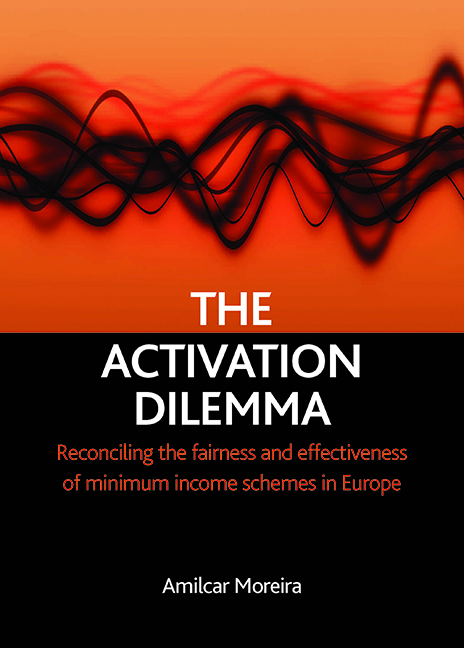 The Activation Dilemma
The Activation Dilemma Book contents
- Frontmatter
- Dedication
- Contents
- List of tables and figures
- List of abbreviations
- Acknowledgements
- one Introduction
- two The right to a minimum income: between Mead and Van Parijs
- three Justifying a minimum income guarantee: the right to personal development
- four The activation dilemma: a comparative study
- five Measuring respect for the right to personal development
- six The employment effectiveness of minimum income schemes
- seven The employment effectiveness of minimum income schemes and their respect for the right to personal development
- eight Conclusion
- Appendix A Methodology for benefit comparison
- Appendix B Unemployment reintegration capacity (URC): sensitivity analysis
- Appendix C Qualitative comparative analysis: laws of Boolean algebra
- References
- Index
- Also available from The Policy Press
three - Justifying a minimum income guarantee: the right to personal development
Published online by Cambridge University Press: 21 January 2022
- Frontmatter
- Dedication
- Contents
- List of tables and figures
- List of abbreviations
- Acknowledgements
- one Introduction
- two The right to a minimum income: between Mead and Van Parijs
- three Justifying a minimum income guarantee: the right to personal development
- four The activation dilemma: a comparative study
- five Measuring respect for the right to personal development
- six The employment effectiveness of minimum income schemes
- seven The employment effectiveness of minimum income schemes and their respect for the right to personal development
- eight Conclusion
- Appendix A Methodology for benefit comparison
- Appendix B Unemployment reintegration capacity (URC): sensitivity analysis
- Appendix C Qualitative comparative analysis: laws of Boolean algebra
- References
- Index
- Also available from The Policy Press
Summary
Reflecting on Mead and Van Parijs’ failure to provide an adequate justification of the right to a minimum income, Chapter Two argued that a more satisfactory alternative is possible. This chapter aims to develop a normative framework to provide such justification. As demonstrated earlier, the reason behind Mead and Van Parijs’ failure lies in their assumptions about the relation between the individual, the market and society that underlie their work. Therefore, the first step in this endeavour will be to delve into the literature that sets the foundations of modern social and political theory to find an ontological framework from which a more adequate justification of the right to a minimum income can be derived.
Rather than going through a comprehensive review of all the relevant views in classical social and political theory, it seems more useful to focus instead on a restricted number of authors – in this case Emile Durkheim, Karl Marx and John Stuart Mill – who proposed influential views about how society and market condition individuals’ capacity to explore their inner abilities. In order to facilitate the comparison between the three authors, we need to look at the conception of human nature that underlies their work. As it identifies the biological and psychological traits of individuals, and the external factors that condition the ability of individuals to realise their true nature (Duncan, 1983, pp 6-7), the notion of human nature provides an interesting analytical tool that facilitates comparison between the authors’ views of the relationship between the individual, the market and society. Hence, the following sections look at the conception of human nature that underpins the work of Durkheim, Marx and Mill.
Durkheim, Marx and Mill's conceptions of human nature
Although he refuses to specify the general characteristics of human nature (see Gray, 1996, pp 205-6), we can identify the three main traits of Mill's conception of human nature in his writings on happiness and individuality. The first concerns an individual's tendency for self-realisation. This is evident in Mill's writings on happiness, which he upholds as the ultimate aim in the organisation of social life. In his book Utilitarianism (1861), Mill puts forward a pluralistic conception of happiness. Here individual happiness is related to one's own particular needs, endowments and personality.
- Type
- Chapter
- Information
- The Activation DilemmaReconciling the Fairness and Effectiveness of Minimum Income Schemes in Europe, pp. 33 - 48Publisher: Bristol University PressPrint publication year: 2008


